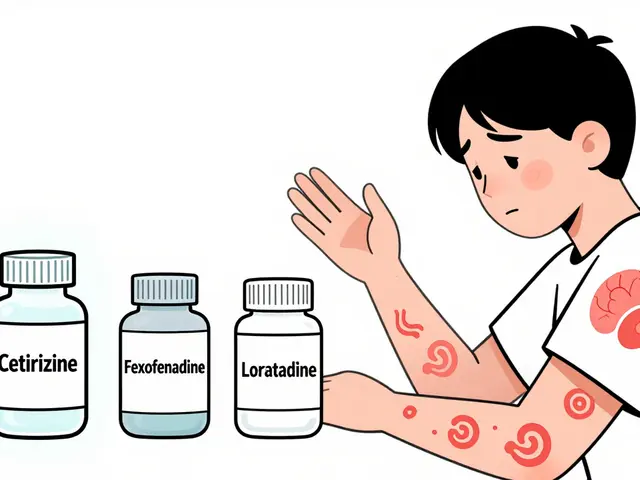When it comes to managing conditions like asthma or allergies, Prelone—a well-known corticosteroid—stands out. But what if Prelone doesn't suit your specific needs? The world of medicine offers numerous alternatives, each with its own set of strengths and limitations. While switching medications can seem daunting, understanding these options gives you the freedom to find what's best for your health.
In this article, we will explore various alternatives to Prelone, shedding light on how they work, where they excel, and potential drawbacks to consider. By equipping yourself with knowledge about these alternatives, you'll be better prepared to discuss options with your healthcare provider and make choices that align with your health objectives. Let's dive into the alternatives that could make a significant difference in your treatment journey.
- Fluticasone
- Beclomethasone
- Budesonide
- Triamcinolone
- Prednisone
- Dexamethasone
- Mometasone
- Hydrocortisone
- Methylprednisolone
- Conclusion
Fluticasone: A Trusted Choice for Targeted Relief
As you explore alternatives to Prelone, one name that frequently emerges in discussions is Fluticasone. This medication, highly regarded in the medical community, is an inhaled or topical corticosteroid commonly utilized to manage asthma and various skin conditions. Its primary advantage lies in its ability to provide targeted treatment with minimal systemic effects.
How Fluticasone Works
Fluticasone works by reducing inflammation and suppressing an overactive immune response. When inhaled, it directly targets the respiratory tract to alleviate symptoms of asthma by decreasing airway swelling and irritation. For dermatological applications, topical forms concentrate the medication's effects on the skin, mitigating inflammation caused by eczema or psoriasis.
Pros
- Low systemic absorption: Fluticasone's localized action minimizes systemic exposure, reducing the risk of widespread side effects.
- Effective for localized use: Ideal for targeting specific areas, whether in the lungs or on the skin, enhancing its efficacy for intended conditions.
Cons
- Not suitable for systemic indications: Patients requiring systemic intervention may need to consider other options, as Fluticasone focuses mainly on localized treatment.
User Considerations
While Fluticasone is widely used for asthma treatment, it’s important for patients to use it consistently to maintain control of their symptoms. Users should follow prescribed dosages and regularly consult their healthcare providers to adjust treatment as necessary.
Fluticasone comes in various forms including inhalers, creams, and nasal sprays, offering flexibility depending on the condition being treated.
Fast Facts
| Form | Usage | Typical Conditions Treated |
|---|---|---|
| Inhaled | Respiratory relief | Asthma, allergies |
| Topical | Skin treatment | Eczema, psoriasis |
| Nasal spray | Allergy symptom management | Allergic rhinitis |
In conclusion, Fluticasone serves as a powerful alternative in specific scenarios where localized corticosteroid action is desired, while its systemic absorption remains considerably low.
Beclomethasone
Beclomethasone is a notable alternative to Prelone, frequently recommended for the management of asthma and allergic rhinitis. As an inhaled corticosteroid, it plays a crucial role in suppressing inflammation within the airways, making it an essential therapy for long-term asthma control. Unlike Prelone, which is often utilized for systemic conditions, Beclomethasone provides targeted relief with a minimized risk of widespread side effects.
In the world of respiratory health, Beclomethasone goes beyond just easing airflow. It's about improving quality of life by allowing patients to breathe easier and experience fewer daily symptoms, which can significantly enhance one's daily activities and overall well-being.
Pros
- Effective for managing chronic asthma.
- Reduces the frequency of asthma exacerbations.
- Minimal systemic absorption reduces the risk of serious side effects.
- Less systemic impact compared to oral corticosteroids.
Cons
- Prolonged use can result in thrush or hoarse voice.
- Requires consistent, daily use for optimal benefits.
- May not be suitable for acute asthma attacks.
Beclomethasone is well-regarded for its ability to keep asthma under control without the patient experiencing the full force of corticosteroid side effects. This makes it ideal for many, especially those who prefer inhaled medications over oral alternatives, due to convenience and a lower incidence of adverse reactions. However, it is vital for users to adhere to the prescribed regimen, as the benefits of Beclomethasone are closely tied to consistent use over time.
Budesonide
Budesonide stands as a prominent alternative to Prelone, widely recognized for its versatility in treating various conditions. This medication primarily functions as an inhaled corticosteroid, often prescribed for chronic conditions like asthma and chronic obstructive pulmonary disease (COPD). Additionally, Budesonide comes in handy for inflammatory bowel diseases and certain skin conditions in topical forms. With its multi-faceted applications, Budesonide offers a robust alternative for individuals seeking a tailored treatment approach.
Pros
- Budesonide exhibits excellent efficacy in reducing inflammation associated with asthma treatment, making breathing easier for patients.
- When used as an inhaler, Budesonide targets the lungs directly, minimizing systemic effects and reducing the risk of side effects typical of oral corticosteroids.
- This drug is also available in forms that can be prescribed for digestive tract use, such as oral or enema formulations, making it versatile for treating gastrointestinal issues like Crohn's disease.
Cons
- While Budesonide provides localized treatment, it might not be as effective for systemic conditions requiring comprehensive management across different body systems.
- Potential side effects, though less common, can include oral thrush when used in inhaler form or skin irritation when applied topically.
- For some patients, particularly those on long-term therapy, Budesonide may necessitate a gradual dose decrease to prevent complications like adrenal suppression.
Given its targeted action and multiple delivery mechanisms, Budesonide represents a compelling option among Prelone alternatives. Patients and healthcare professionals often view it as a strategic choice for managing inflammation efficiently, while also minimizing systemic exposure and attendant risks. A conversation with a healthcare provider will determine if Budesonide aligns with your specific health needs, enabling an informed and personalized medication plan.
Triamcinolone: A Versatile Corticosteroid Alternative
Triamcinolone is a formidable choice when considering alternatives to Prelone, especially for those looking for a diverse range of applications. This particular corticosteroid is not only potent but also adaptable, available in several formulations including injections, creams, and nasal sprays. It's utilized across a spectrum of conditions, from inflammatory skin issues to seasonal allergies, showcasing its remarkable versatility.
Pros
- Variety of Formulations: Triamcinolone offers multiple applications, making it a convenient choice for both localized and systemic treatments.
- Effectiveness: Highly effective in reducing inflammation and suppressing immune responses, ensuring rapid relief from symptoms.
- Flexibility: Suitable for both long-term and short-term treatments with minimal side effects when used correctly.
Cons
- Potential Systemic Effects: When used in large doses or over extended periods, there is a risk of systemic absorption, particularly with injections.
- Possible Side Effects: Skin thinning, changes in pigmentation, and potential hormone imbalance in some users.
- Prescription Requirement: Access to Triamcinolone, especially in injectable or high-potency forms, generally requires a prescription and medical supervision.
Triamcinolone has been a preferred choice in dermatology for its robust anti-inflammatory properties. Whether you're dealing with stubborn eczema patches or battling allergic rhinitis, this corticosteroid has the chops to handle a range of conditions effectively.
Interestingly, a 2019 study published in the Journal of Clinical Medicine found that Triamcinolone injections had high efficacy in treating keloids, offering promising results with reduced recurrence rates. This adds another feather to its cap, showing its potential in specialized scenarios where other treatments might fall short.
Making the most out of Triamcinolone requires careful consideration of its usage and a clear dialogue with healthcare providers about potential risks and benefits in your specific case. It's always wise to be aware of the breadth and borders of what any medication can offer. As an alternative to Prelone, Triamcinolone stands strong, bringing its A-game to the corticosteroid arena.
Prednisone
Among the myriad options for corticosteroid treatment, Prednisone stands as a versatile choice, often recommended for its broad application spectrum. As an oral medication, Prednisone is commonly used to treat conditions such as asthma, rheumatoid arthritis, lupus, and certain types of cancer. Its reputation for effectively suppressing the immune system makes it a cornerstone in managing inflammatory and autoimmune disorders.
Mechanism of Action
Prednisone works by mimicking the effects of corticosteroids produced naturally by your adrenal glands. It reduces inflammation and reduces the activity of the immune system by inhibiting the release of substances in the body that cause inflammation. This mechanism makes it effective in reducing swelling, redness, pain, and discomfort caused by inflammatory conditions.
Pros
- Wide Range of Uses: Prednisone's flexibility in treating various conditions makes it highly valuable in medical practice.
- Systemic Effects: Its capability to be absorbed systemically allows it to target internal inflammation effectively.
- Controlled Dosages: Available in multiple dosages, which helps in tailoring the treatment plan to the patient’s specific requirements.
Cons
- Systemic Side Effects: Long-term use can lead to significant side effects such as osteoporosis, hypertension, and increased risk of infections.
- Gradual Tapering Needed: Stopping Prednisone abruptly can cause withdrawal symptoms, necessitating a gradual reduction in dose.
- Weight Gain and Mood Changes: Patients may experience changes in appetite and mood, including anxiety or depression.
Notable Considerations
While Prednisone’s effectiveness as an anti-inflammatory is irrefutable, it requires careful management to mitigate its potential side effects. It's crucial to follow a healthcare provider’s guidance on dosage and duration since inappropriate use can result in complications.
An interesting finding from a recent publication in the Journal of Clinical Endocrinology highlighted that around 30% of long-term Prednisone users developed shrinkage in the adrenal glands, emphasizing the need for periodic review of its necessity by healthcare professionals.
In summary, Prednisone remains a powerful tool in the medical arsenal, but like any tool, it must be used wisely. It's essential for patients considering Prednisone to have a thorough consultation with their healthcare provider to weigh the benefits against the potential risks, ensuring a path to optimal health management.

Dexamethasone
Dexamethasone is a highly potent corticosteroid used in a variety of medical treatments, ranging from reducing inflammation to managing autoimmune conditions. As an alternative to Prelone, Dexamethasone stands out for its efficacy in severe inflammatory and allergic conditions. It's often utilized in conditions where more aggressive treatment is required due to its strong anti-inflammatory effects.
Pros
- High potency, making it effective for severe conditions.
- Flexibility in administration, available in oral, injectable, and topical forms.
- Potential use in emergency situations, such as acute allergic reactions.
- Prolonged biological half-life, meaning fewer doses are typically needed.
Cons
- Higher risk of systemic side effects due to its potency.
- Long-term use can lead to complications such as bone density loss or adrenal suppression.
- May require careful monitoring and dosage adjustments by healthcare providers.
Dexamethasone offers a distinct advantage in terms of treatment versatility and efficacy, especially where aggressive intervention is needed. However, its potency also translates into a greater need for vigilance regarding potential side effects. Users of Dexamethasone should maintain regular consultations with their healthcare providers to ensure optimal outcomes, adjusting dosage as necessary based on their individual health profile and response to treatment.
A study conducted in 2022 demonstrated that Dexamethasone significantly improved outcomes for hospitalized patients requiring intensive care, by reducing systemic inflammation and moderating immune response. This highlights its important role not only as an alternative to medications like Prelone but also as a crucial tool in the pharmacological arsenal for serious illnesses.
| Attributes | Dexamethasone | Prelone |
|---|---|---|
| Potency | High | Moderate |
| Mode of Administration | Oral, Injectable, Topical | Oral |
| Common Use | Severe inflammation, Emergency allergic reactions | General inflammation, Asthma |
While Dexamethasone presents a potent alternative, it requires careful consideration of risks and benefits, making it essential for patients to engage in open dialogue with their healthcare team.
Mometasone
Mometasone is a potent corticosteroid used effectively for a variety of inflammatory conditions. Whether dispensed as a cream, inhaler, or nasal spray, Mometasone offers versatile treatment options for both chronic and acute conditions. Its spectrum of application spans from asthma and allergic rhinitis to eczema and psoriasis, making it a coveted choice among healthcare providers.
Pros
- Effectiveness in Asthma Control: As an inhalant, Mometasone helps alleviate asthma symptoms by reducing airway inflammation, thus improving breathing and preventing asthma attacks.
- Topical Application: When used as a cream, it provides targeted relief for skin conditions, minimizing systemic absorption and reducing potential side effects.
- Allergy Relief: Known for its efficacy in treating nasal symptoms of allergic rhinitis, Mometasone can significantly improve quality of life for allergy sufferers.
Cons
- Possible Side Effects: Patients may experience local irritation or dryness when using Mometasone topically or nasally.
- Long-term Use Restrictions: Prolonged use can lead to thinning of the skin when used topically and potential growth suppression in children when inhaled.
One of the key advantages of using Mometasone is its ability to offer localized treatment with minimal systemic involvement. This characteristic makes it particularly appealing for long-term management without significant systemic side effects. However, careful monitoring is advised to prevent overuse, especially in vulnerable populations such as young children.
Clinical Insights
Recent studies have shown that Mometasone nasal sprays are effective in managing symptoms of nasal congestion in both seasonal and perennial allergies. Moreover, its inhalable form has proven efficacy comparable to higher-dose corticosteroids, often resulting in more comfortable treatment paradigms for patients with respiratory issues. Physicians frequently turn to Mometasone as a reliable alternative when managing complex allergic and inflammatory conditions.
Hydrocortisone: A Versatile Corticosteroid Alternative
Hydrocortisone is one of the most frequently used corticosteroids, versatile enough to serve a multitude of purposes from treating inflammation to managing autoimmune conditions. It's a common choice in both prescription and over-the-counter forms, known for its ability to effectively manage skin disorders, reduce swelling, and treat adrenal insufficiency.
Unlike some more potent steroids, hydrocortisone is often preferred for mild to moderate conditions due to its lower potential for side effects, making it a staple in many medicine cabinets.
How It Works
Hydrocortisone mimics the natural steroid hormones produced by the adrenal glands, enhancing the body's ability to suppress inflammation and allergic reactions. Its role is crucial in reducing the activity of the immune system, which can be beneficial in conditions where the body's immune response is overactive.
Pros
- Readily available in multiple forms including creams, ointments, and injections.
- Widely recognized for its effectiveness in treating a range of mild skin irritations.
- Often recommended for adrenal insufficiency due to its systemic benefits.
Cons
- Prolonged use can lead to skin thinning, especially with topical applications.
- Less potent than other corticosteroids, which might be necessary for severe conditions.
- Potential to cause side effects like an increase in blood pressure or glucose levels if overused.
Available in various preparations, from topical ointments suitable for diaper rash to oral tablets for more chronic conditions, hydrocortisone is adaptable. However, it's crucial to tailor its use to specific conditions to avoid complications.
Common Usage and Recommendations
While hydrocortisone is user-friendly and accessible, it requires careful handling to avoid dependency or overuse complications. Healthcare professionals typically recommend starting with a mild concentration, especially for children, and only for short-term use.
It's prudent for patients to work closely with their healthcare providers to monitor the medication's impact, adjusting dosages or switching formulations as necessary.
As always when exploring options like hydrocortisone, awareness and education are vital allies in managing health proactively and safely.
Methylprednisolone: A Comprehensive Overview
When discussing corticosteroid alternatives to Prelone, Methylprednisolone emerges as a robust choice. Known for its powerful anti-inflammatory and immunosuppressant properties, it is employed across a range of medical conditions, from severe allergic reactions to autoimmune disorders and some cases of arthritis.
Methylprednisolone is available in several forms including oral tablets, injections, and topical preparations. This versatility allows it to be adapted to various therapeutic needs. For instance, when a rapid systemic response is required, doctors often prefer the injectable form, which can quickly mitigate acute inflammation.
Pros
- Potent Anti-inflammatory and Immunosuppressant: Effective in controlling severe inflammation and modulating overactive immune responses.
- Versatile Forms: Available in oral, injectable, and topical applications, allowing personalized treatment plans.
- Rapid Action: Particularly the injection form, which provides quick relief in emergency situations.
Cons
- Side Effects: Long-term use can lead to significant side effects such as osteoporosis, hypertension, and elevated blood sugar levels.
- Systemic Conditions: Potential for more significant systemic effects compared to topical corticosteroids.
In the context of long-term management, it is crucial to balance the beneficial outcomes of Methylprednisolone with its potential side effects. Periodic evaluations and adjustments made by healthcare professionals can customize treatment, optimizing results and minimizing risks.
For those interested in some key metrics for Methylprednisolone in comparison to other corticosteroids, consider this simplified table of relative potency levels for anti-inflammatory effect:
| Medication | Relative Potency |
|---|---|
| Prelone (Prednisolone) | 1 |
| Methylprednisolone | 4 |
| Dexamethasone | 25 |
This table provides a perspective on how Methylprednisolone stands in terms of potency, potentially aiding discussions with healthcare providers about its use and effectiveness as an alternative to Prelone.
Conclusion
Choosing the right medication for your health condition is crucial, and this includes being informed about Prelone alternatives. Throughout this article, we've explored a variety of corticosteroid options that serve different purposes and medical needs. Each alternative presents unique benefits and limitations, making the decision a highly personal one, dependent upon individual health factors and treatment goals.
For instance, Fluticasone and Mometasone are excellent options if you're seeking a targeted solution for localized issues like asthma or skin conditions, given their low systemic absorption. On the other hand, more systemic approaches are embodied by options like Prednisone or Dexamethasone, which are designed for broader spectrum effects.
In weighing these choices, it is vital to consult with your healthcare provider to understand which option aligns best with your health profile. Considerations might include the severity of your condition, any concurrent health issues, potential side effects, and how each medication might interact with other treatments you are undergoing.
Comparative Overview
The table below summarizes the key features of each alternative, allowing for an at-a-glance comparison to aid your discussion with your healthcare professional:
| Medicine | Strength | Focus | Common Use |
|---|---|---|---|
| Fluticasone | Low Systemic | Localized | Asthma, Skin |
| Prednisone | Systemic | Various | Inflammation |
| Dexamethasone | Systemic | Severe Cases | Anti-inflammatory |
Ultimately, the goal is to ensure that your treatment not only alleviates your symptoms but also suits your lifestyle and long-term health plan. By understanding the landscape of available alternatives, you empower yourself to make informed, confident decisions about your healthcare path. Embrace this knowledge in shaping your journey toward better health management, allowing both efficacy and safety to guide your choice.





joe balak
Fluticasone is solid for asthma but don't sleep on budesonide. I switched after three years of thrush and my lungs haven't felt this clear since 2018. No more hoarse voice, no more constant throat clearing. Just breathe.
Iván Maceda
USA made the best steroids. 🇺🇸 Everyone else is just copying. Budesonide? Cute. But we got prednisone that actually works. 🇺🇸
Vrinda Bali
You all know the pharmaceutical companies are pushing these 'alternatives' to replace Prelone because they're patenting new formulations. They don't care about your lungs. They care about quarterly profits. 🕵️♀️💊
Sonia Festa
Prelone? More like Pre-lonely. I switched to methylprednisolone and now I'm out here living my best life. No more feeling like a zombie with a side of moonface. 🤙
Sara Allen
i just took prednisone for my allergies and now i cant stop eating and my face looks like a balloon?? why is this even a thing?? i just wanted to breathe not turn into a gremlin
Amina Kmiha
They’re hiding the truth. Dexamethasone was used in COVID trials. That’s why they’re pushing it now. They want you dependent on it so they can control the narrative. 🧪👁️🗨️
Ryan Tanner
You got this. Seriously. Switching meds is scary but you're not alone. I went from Prelone to mometasone and now I'm hiking again. One step at a time. 🏔️💪
Jessica Adelle
It is imperative that individuals refrain from self-administering corticosteroid alternatives without the direct supervision of a licensed medical professional. The systemic ramifications of improper usage are not merely speculative-they are empirically documented and gravely consequential.
Emily Barfield
If we consider corticosteroids as metaphors for societal control-localized suppression versus systemic domination-then Fluticasone is the quiet revolution, while Dexamethasone? That’s the state of emergency. Are we treating inflammation… or conditioning compliance?
Sai Ahmed
Why do they always leave out the fact that all these 'alternatives' are made by the same 3 companies? You think you're choosing? You're just picking which flavor of the same poison to swallow.
Albert Schueller
The table in the article lists dexamethasone as 25x more potent than Prelone-but that's based on animal studies. Human metabolism varies. The data is misleading. And the author didn't cite the original paper. 🤔
Ted Carr
Ah yes, the classic 'comprehensive guide' that's just a 12-page pharma ad with bullet points. Next they'll tell us hydrocortisone is 'revolutionary' because it's in a squeeze tube now. 🙄
Bradley Mulliner
You people act like this is some kind of medical breakthrough. Everyone knows prednisone wrecks your body. You're just swapping one slow death for another. Congratulations on being a statistic.
Rahul hossain
The real issue is not the medication-it is the systemic neglect of holistic approaches. Why do we rely on chemical suppression when dietary modulation, breathwork, and environmental detoxification remain under-researched? We have become a civilization addicted to quick fixes.
Reginald Maarten
Actually, methylprednisolone is 5x more potent than prednisolone, not 4x. The table is wrong. And dexamethasone is 25–30x depending on the receptor binding assay. Also, 'Prelone' is just a brand name for prednisolone-so technically none of these are 'alternatives' to Prelone, they're alternatives to prednisolone. Fix your headline.
Jonathan Debo
I mean, I suppose if you're not a medical doctor with a PhD in pharmacokinetics, you shouldn't even be reading this. The nuances of receptor affinity, hepatic metabolism, and cortisol feedback loops are beyond the intellectual capacity of the average Reddit user. But by all means, keep scrolling.
Robin Annison
I’ve been on budesonide for 8 years. It’s not perfect. But it lets me play with my kids without feeling like I’m drowning. Sometimes the best choice isn’t the strongest-it’s the one that lets you live.
Abigail Jubb
I just cried reading this. I thought I was alone. Everyone says 'just take the pill' but no one talks about how it makes you feel like a stranger in your own skin. Thank you for writing this. 💔
George Clark-Roden
It’s fascinating… the way we treat inflammation as an enemy to be crushed, rather than a signal to be understood. What if our bodies aren’t broken… but begging? What if the real alternative isn’t another steroid… but listening? I’ve seen people reverse asthma symptoms with breathwork and trauma therapy. Not magic. Just… humanity.